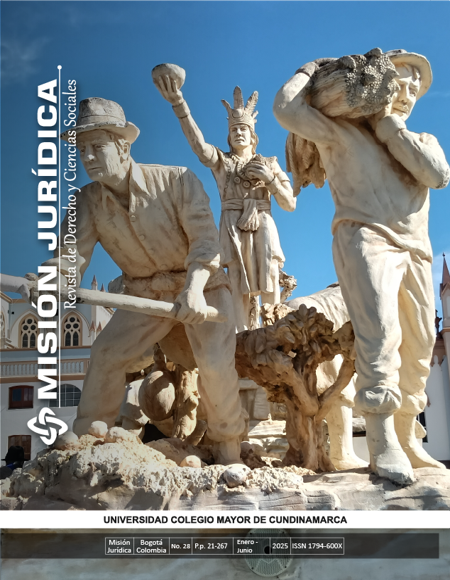A Brief Account of the Rise and Fall of the "Ancient Chinese Legal System" and a Comparison with the Romano-Germanic Legal System
Historia breve del auge y declive de la “Familia Jurídica de Antigua China” y comparación con la Familia Jurídica Romano-Germánica

This work is licensed under a Creative Commons Attribution-NonCommercial-NoDerivatives 4.0 International License.
Show authors biography
This article aims to introduce the reader to the definition, history, and main characteristics of the "Chung Hwa or ancient Chinese Legal System", and to compare it with the Romano-Germanic Legal System through a macro-comparison approach. This methodology shows the differences between the two systems from multiple perspectives. The article begins by defining the "Chung Hwa Legal System," distinguishing it from the contemporary Chinese legal system, and presents a brief chronology of its rise and fall, inquiring into the causes of its final decline in the political, economic, and cultural aspects. Then, macro-comparisons are made between the Chung Hwa and the Romano-Germanic Legal Systems, focusing mainly on their differences in four aspects: the division between public and private law, how rights can be redressed, how the judicial system and the philosophy of law operate. We conclude that the "Chung Hwa Legal System" in China declined and eventually disappeared along with the feudal regime, due to the lack of development in the field of private law, the limited variety of rights redress mechanisms, and the lack of independence in the judicial system. These factors resulted in its inability to adapt to historical and epochal changes.
Article visits 60 | PDF visits 34
Downloads
- Aristóteles. (2015). Obras completas de Aristóteles (P. de Azcárate, Trad.). Ebooklasicos.
- Arminjon, P., Nolde, B. B., & Wolff, M. (1950). Traité de droit comparé. Tome I. Legal Monographs and Treatises.
- Chen, Z. (1980). A preliminary study on the characteristics of the Chinese legal system. Juridical Studies, (1), 91–99.
- Confucio. (2019). Analectas (S. Leys, Trad.). Editorial Edaf.
- Han, F. (2023). Libro del maestro Han Fei: El arte de la política (G. García-Noblejas, Trad.). Tecnos.
- Hegel, G. W. F. (1968). Filosofía del derecho (A. Mendoza de Montero, Trad.). Claridad.
- He, Q. (2013). A study of the evolution of civil law legal system. Modern Law Science, 35(1), 3–17.
- He, Q., & Wang, J. (2018). The rise and fall of the Chinese legal system. Jianghai Academic Journal, (5), 147–156.
- Huang, R. (2012). Reflections on ancient Chinese doctrine of severe punishment. Academic Research, (10), 119–121.
- Jhering, R. von. (1985). La lucha por el derecho (A. Posada, Trad.). Civitas.
- Justiniano. (1889). Cuerpo del derecho civil romano (I. L. García del Corral, Trad.). Lex Nova.
- Li, Y. (2024). La internacionalización del derecho civil de contratos. Revista Misión Jurídica, 17(27), 163–181.
- Liu, Y. (2014). 中国古代的神判制度 [Antiguo sistema de juicio divino chino]. https://bjgy.bjcourt.gov.cn/article/detail/2014/10/id/1471868.shtml
- Liu, Y. (2012). Experimental discussion on the basic features of the Chinese legal system. Culture Journal, (4), 78–81.
- Lu, J. (2015). 犯罪门槛下降及其对刑法体系的挑战 [La reducción de los umbrales de delincuencia y sus desafíos para el sistema de derecho penal]. 中国刑事法律网 [Red de Derecho Penal de China]. https://www.spp.gov.cn/llyj/201503/t20150306_92252.shtml
- Montesquieu. (2015). Del espíritu de las leyes (M. Blázquez & P. de Vega, Trad.). Alianza Editorial.
- Platón. (2013). La república o el estado (P. de Azcárate, Trad.). Espasa Libros.
- Qu, T. (1961). Law and society in traditional China. The Commercial Press.
- Tian, M. (2004). Legal philosophy between East and West: A comparative study of John Ching Hsiung Wu's early legal philosophical thought. China University of Political Science and Law.
- Wang, Y. (2017). The Duke of Zhou: The founder of the early Chinese tradition of ritual and law. Citizens and the Law, (1), 46–51.
- Zhang, J. (2010). Interpreting the indigenes of the Chinese legal system. Tribune of Political Science and Law, 28(5), 3–10.
- Zweigert, K., & Kötz, H. (2013). Introducción al derecho comparado. Oxford Educación.




















